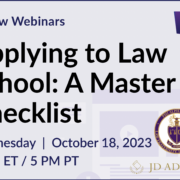Our Top Four LSAT Study Habits
Our Top Four LSAT Study Habits
Now that the November 2018 LSAT is less than 6 weeks away, now is the time to really focus on your prep. In this post, we break down our top four LSAT study habits that will help you be fully prepared for test day!
Our Top Four LSAT Study Habits
1. Always time your prep
We are like a broken record on this issue: you should start timing yourself early in your LSAT preparation and keep doing so until you take the exam. There are a couple reasons this is one of the best LSAT study habits. The first, most obvious one is that it will better prepare you for test day. If you practice under testing conditions, there won’t be any surprises when you sit for the exam. You will know how to pace yourself, and also how you cope when a question is tough. Timing is such a crucial element of the LSAT. Make sure you prepare for it by emulating testing conditions as early, and as often, as possible.
Another reason this is a good LSAT study habit is that it is REALLY hard to undo bad study habits. We’ve found that students who don’t time themselves early struggle to implement timing changes into their routine. This is most likely due to habit. If you give yourself all the time in the world to get the correct answer when you first start studying, your mind is trained to work at the pace you’ve established. Of course, you can learn to speed up down the line. However, it’s better to establish good LSAT study habits early and avoid spinning your wheels making changes a few weeks before the exam.
2. Develop and study schedule.
This is another great LSAT habit to get into. Developing a study schedule early in your prep serves multiple purposes. First, it allows you to get the full scope of what you need to cover. Spend some serious time investigating what you need to review before you take the LSAT. A great way to do this is to take timed practice LSAT and see how you do. Then, create a schedule that focuses on the areas you need to improve. Your schedule will help you plan out your progress, and keep you on track. If you try to wing it, you are more likely than not going to fall behind.
The second reason for developing a study schedule is one of the great LSAT study habits is that it will keep you honest. Unless you study with others, you are responsible for developing your study pace. Since LSAT review can be a solitary pursuit, creating an overarching framework will give you goals and deadlines to meet. Students rarely prepare themselves well without one. So, spend time developing your schedule. Block off time for each session, and spend the whole time focused on the LSAT.
3. Put yourself in a good study environment based on your preferences.
Another undervalued LSAT study habit is creating a good study environment. Now, this one is going to be relatively subjective. Some people need solitude to really focus on LSAT material. Others are able to block out distractions in the middle of a busy coffee shop. Whatever your approach, make sure you identify early where you best study. Then, try to emulate those conditions a such as possible. The best review for the LSAT happens when you can bear down and focus on the material. If you put yourself in good study conditions, chances are your review will be much more valuable.
4. Don’t be afraid to reach out for help if you get stuck!
The last of our best LSAT study habits is to reach out for help when you need it. Everyone runs into an LSAT problem that confounds them. Often, knowing the right answer does nothing to resolve the confusion. If you get really stuck on a question, don’t hesitate to use a friend, your prep material, or internet LSAT boards to track down an explanation.
Now, this is not implying you shouldn’t struggle through parts of the LSAT. There is huge value in struggling with a concept and breaking through. This will help you develop a strategy for tough questions on test day. However, it is not useful to obsess over a single question you cannot figure out. Utilize friends and prep resources to figure out tricky problems if you do not have the means to sort them out yourself. For example, you shouldn’t reach out if you struggle with a Logic Game, but know how to solve it. You should reach out if you have no idea how to even start getting the answer.
Pursuing Law School? We’ve Got You Covered!
🌟 Special Offer: Enroll in our FREE on-demand law school prep course, meticulously crafted by a top-ranked law student. Secure your spot now







Leave a Reply
Want to join the discussion?Feel free to contribute!